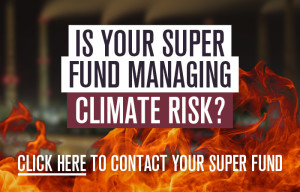How is your super fund managing climate risk?
 It’s the question most super funds don’t want to be asked, but could be one of the most important for the health of the environment, as well as your retirement savings.
It’s the question most super funds don’t want to be asked, but could be one of the most important for the health of the environment, as well as your retirement savings.
Climate risk is fast shaping up as the issue that will dominate investor behaviour over the next decade. Pension funds and major investors across Europe are already planning for – or already starting – divestment from the fossil fuel sector. Some are describing fossil fuel assets as being potentially worthless in 10 years time as the world moves away from high-carbon development, and are selling out before the fossil fuel assets lose their value.
So where does your super fund stand? You can find out how your super fund is managing climate risk – by asking them. Market Forces has made it easy.
Visit our online action, to send them an email to ask where they stand on managing climate risk
In November 2013, Australian superannuation funds were given an ideal opportunity to demonstrate that they were serious about managing climate risk for their members when Ian Dunlop – former fossil fuel executive turned climate change campaigner – nominated for the BHP Billiton board on a climate platform. His argument was that climate change would affect every aspect of BHP’s business and he received support from some major institutional investors in his quest.
But Chairman Jac Nasser was not so encouraging. Despite BHP being named (on the same day as the vote for Ian Dunlop’s nomination) as one of the top 20 companies responsible for greenhouse gas emissions since the industrial revolution and having recently taken a position to support the repeal of Australia’s carbon price, he claimed BHP was doing enough to manage its climate risks and instructed many investors to vote against Ian. Most of them did as they were told. Among these investors will be many Australian super funds, who will have voted against Ian Dunlop’s nomination on behalf of millions of Australians.
We think this is wrong. And that’s why we’ve made it easy for you to find out four key things about your super fund:
- Did they demonstrate good faith in managing climate risk by voting in favour of Ian Dunlop at the BHP annual general meeting?
- Do they believe that in order to keep global warming below 2 degrees do they agree with Carbon Tracker that 4/5 of the world’s fossil fuel reserves need to remain in the ground?
- How exposed are they to the fossil fuel sector?
- Do they have any plans to divest from the fossil fuel sector, as funds in Europe are preparing to do?
The answers to these questions will help you, as a member with your retirement savings invested in your super fund, find out how seriously they take climate change and how well they manage climate risk. Don’t expect answer straight away, but remember that your super fund is managing your money and is obliged to engage with you. So keep up the communication until you get your questions responded to.
Tell your super fund you want answers on how they are managing climate risk!





